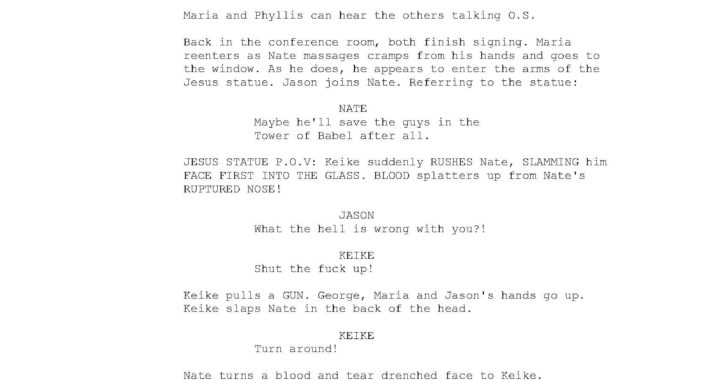 The question that follows from a student filmmakers led me to the memory of trying to sell my first screenplay to Hollywood. What I learned from that experience was that the way you begin a screenplay can determine whether it ever finds a buyer at all. Check it out:
The question that follows from a student filmmakers led me to the memory of trying to sell my first screenplay to Hollywood. What I learned from that experience was that the way you begin a screenplay can determine whether it ever finds a buyer at all. Check it out:
“Hello writers! I’m writing a crime screenplay. The plots, characters, etc. are well planned. Ready to write my screenplay after research and brainstorming, I was clueless on how to start my screenplay. A series of scenes? Montage? A simple establishing shot?
Please gimme some ideas on how to start a screenplay powerfully.”
I have some insights into what you want to do to start your screenplay towards the end of this blog, but before I tell you that, here’s what you don’t want to do:
Prior to my getting my first Literary Agent, I decided to write my film by beginning with the dramatic climax of the film–when the lead character is suddenly and viciously attacked by his friend. The scene was very violent and shocking. At the point where the lead is about to pass out (or die–part of the mystery), I used Flashback to relate how he got into that situation. It read very well. The screenplay made it through the semi-finals of the Chesterfield Film Co Writer’s Film Project and landed me a manager and attorney representation.
Agents however seemed a bit cold on the script. William Morris and CAA gave it “recommend” coverage, but passed. What was wrong?
When I landed my agent through the help of my manager, I learned what was wrong. It couldn’t be sold. What held readers’ attentions and made them cry when they read it somehow managed to disappoint different production companies for different reasons. Why?
Here’s what my agent told me:
“The film starts violently, which works for producers who want to make a violent film. But then there is no other strong violence in the film until the end. The producers who want to make a violent film would be disappointed in the lack of violence and find it too intelligent. However, those who want to make an intelligent drama would never read beyond the first violent scene.”
That revelation blew my mind. As soon as we made the change (started the movie from the beginning without using flashback), reactions grew more positive and a production company came on board.
What people don’t often tell you about films is that it’s not usually just how good the script is, but whether someone will make it. Is there a producer who wants to make that kind of film? That’s why so many scripts follow the same formulas today–because it’s not about being the coolest or the most creative, it’s about being able to sell what you’ve written. At least that’s the only way to get someone to give you money for it. It’s something I wish I knew before I moved to Hollywood. It took me years of frustration to learn. I’m not saying I agree with it. I think a lot of really good films don’t get made. But what I am saying is that it is the way it is.
So how do you start your script?
Try starting the screenplay at a point where one of two things happens–you have the inciting incident or you have the main character in his original state. In essence, start at the beginning.
Many films you’ll see will have two starts. One is meant to generate interest, then another one comes on later. Think The Matrix–the Trinity scene at the beginning piques your interest, and makes you go “wow, cool.” It starts the movie in that we learn there is something weird going on and there are people (agents) chasing a phenomenally acrobatic and armed, marshal arts, femme fatal but it’s not very clear what’s going on until much later. The other start, in some ways the real start, happens with Neo sleeping at his computer–the hero in his pre-hero world. It isn’t until much later that we learn that the Trinity scene was actually Trinity in her day-to-day world too.
Most screenplays start with either the inciting incident or the day-t0-day (and a few pull off both). Law and Order starts with the inciting incident–a dead body found at the beginning of each show. So also does Jaws (the shark attack), Jurassic Park (the finding of the mosquito in the Amber) and The Shawshank Redemption (the wife’s murder).
Many more films start with the day-to-day, even if it’s mundane. Such a beginning can create suspense as the audience gets to know your characters while waiting to see what is going to happen to kick-start the story. If it’s the day-to-day world of a character in a comedy, it should be funny, etc. I think of “As Good as It Gets” for this kind of start. Jack Nicholson is just being himself in the beginning–stuffing a tiny dog down a trash chute because he soiled the hallway. It is his character and it adds to the plot later. Other films that start with the day-to-day? Training Day, Castaway, and Three Kings. The day-to-day should reflect the character’s life–whether it’s blah, intense, stressed, or hilarious. The best films come from character, so make sure we know your characters.
But, as important as it is for the audience to know your characters, if you want to sell a script, make sure that as the writer, you know your buyers.
I hope this saves you some frustration. It’s something I wish I knew before I moved to Hollywood.
Good luck,
TRL
